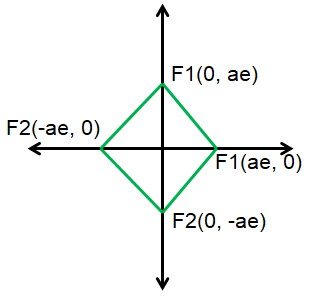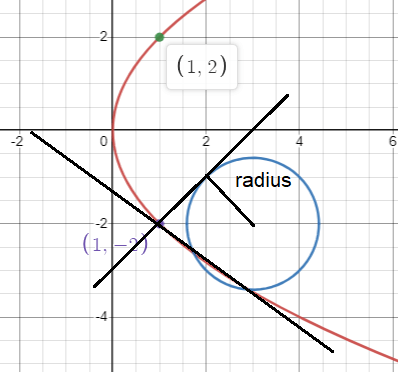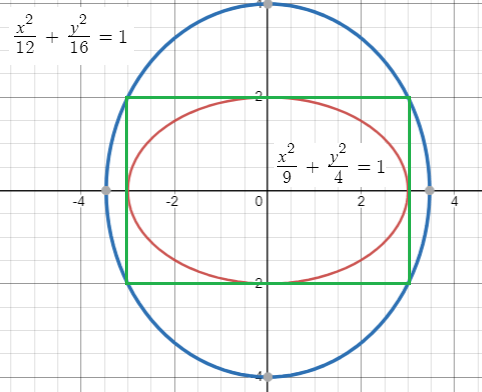CONIC SECTION PROBLEMS ON ELLIPSE AND HYPERBOLA
Problem 1 :
The eccentricity of the hyperbola whose latus rectum is 8 and conjugate axis is equal to half of the distance between the foci is
a) 4/3 b) 4/√3 c) 2/√3 d) 3/2
Solution :
Length of latus rectum = 2b2/a
2b2/a = 8
b2= 4a ------(1)
Length of conjugate axis = half the distance between foci
2b = ae
b = ae/2
Applying the value of b in (1), we get
(ae/2)2 = 4a
a2e2 = 16a
e2 = 16/a
b2 = a2 (e2 - 1)
4a = a2 (16/a - 1)
4a = 16a - a2
a2 -16a + 4a = 0
a2 -12a = 0
a(a - 12) = 0
a = 0 and a = 12
e2 = 16/a
e2 = 16/12
e = √(16/12)
e = √(4/3)
e = 2/√3
So, the eccentricity is 2/√3.
Problem 2 :
If P(x, y) be any point on 16x2 + 25y2 = 400 and foci F1(-3, 0) then PF1 + PF2 is
a) 8 b) 6 c) 10 d) 12
Solution :
The given is equation of ellipse and it is symmetric about x-axis.
a = 25, b = 4
F1 P + F2 P = 2a
2a = 2(5)
= 10
Problem 3 :
The area of quadrilateral formed with foci of the hyperbolas
a) 4(a2 + b2) b) 2(a2 + b2)
c) (a2 + b2) d) 1/2(a2 + b2)
Solution :
The first hyperbola is symmetric about x-axis. Its foci are (ae, 0) and (-ae, 0).
The above hyperbola is symmetric about y-axis. Its foci are (0, ae) and (0, -ae).

It is a rhombus.
Area of rhombus = (1/2) x d1 x d2
= (1/2) x (2ae) x (2ae)
= 2a2 e2
b2 = a2 (e2 - 1)
b2 = a2 e2 - a2
a2 + b2 = a2 e2
Multiplying by 2 on both sides, we get
2(a2 + b2) = 2a2 e2
So, the required area is 2(a2 + b2).
Problem 4 :
If the normals of the parabola y2 = 4x drawn at the end points of its latus rectum are tangents to the circle (x - 3)2 + (y + 2)2 = r2, then the value of r2 is
a) 2 b) 3 c) 1 d) 4
Solution :
y2 = 4x
y2 = 4ax
4a = 4
a = 1
Endpoints of latus rectum are :
x = 1
y2 = 4(1)
y = √4
y = ±2
(1, 2) and (1, -2)
(x - 3)2 + (y + 2)2 = r2

Equation of normal drawn at the point (1, -2).
Equation of tangent for the parabola y2 = 4x
yy1 = 4 (x + x1)/2
yy1 = 2 (x + x1)
y(-2) = 2(x + 1)
-2y = 2x + 2
y = -x - 1, slope of tangent = -1
slope of normal = 1
Equation of normal at the point (1, -2)
y + 2 = 1(x - 1)
y = x - 1 - 2
x - y - 3 = 0
Perpendicular distance between x - y - 3 at the center (3, -2)
distance = |3 - (-2) - 3| / √12+12
= |2| / √2
r = 2/√2
r2 = (2/√2)2
r2 = (4/2)
r2 = 2
Problem 5 :
If x+y = k is a normal to the parabola y2 = 12x, then the value of k is
a) 3 b) -1 c) 1 d) 9
Solution :
Equation of parabola y2 = 12x
4a = 12
a = 3
Equation of normal :
y + xt = at3 + 2at
y + xt = 3t3 + 6t
x + y = k
Using cross product rule to solve for t,
1/1 = 1/t = (3t3 + 6t)/k
|
1 = 1/t t = 1 |
(3t3 + 6t)/k = 1 Applying the value of t. (3+6)/k = 1 k = 9 |
So, the answer is option d.
Problem 6 :
The ellipse E1 :
is inscribed in a rectangle R whose sides are parallel to the coordinate axes. Another ellipse E2 passing through the point (0, 4) circumscribing the rectangle R. The eccentricity of the ellipse is
a) √2/2 b) √3/2 c) 1/2 d) 3/4
Solution :

The ellipse symmetric about y-axis.
The value of a2 will be greater than b2
a2 = 16
By observing the above picture, the ellipse is passing through the point (-3, 2).
Recent Articles
-
Finding Range of Values Inequality Problems
May 21, 24 08:51 PM
Finding Range of Values Inequality Problems -
Solving Two Step Inequality Word Problems
May 21, 24 08:51 AM
Solving Two Step Inequality Word Problems -
Exponential Function Context and Data Modeling
May 20, 24 10:45 PM
Exponential Function Context and Data Modeling